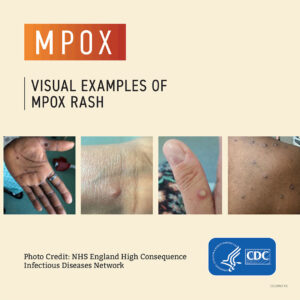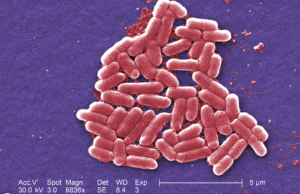
A cluster of new mpox cases in Chicago has alarmed public health officials and prompted warnings of a potential outbreak this summer.
During Pride Month, covering the threat of mpox — formerly called “monkeypox” — may be especially important in communities where vaccination rates are low among those at highest risk of infection. According to the CDC, people who are primarily at risk for infection are gay, bisexual, and other men who have sex with men. Communities with the lowest vaccination rates include Jacksonville, Fla., Memphis, Tenn., and Cincinnati, Ohio.
“My charge to those in the LGBTQ+ community who have not been fully vaccinated — now is the time,” said White House National Monkeypox Response Deputy Coordinator Demetre Daskalakis, M.D., M.P.H., during a May 18 CDC media briefing.
Between mid-April and the end of May, there was a surge of 31 mpox cases reported to Chicago health officials after several months of very few cases (see this Chicago public health data dashboard). Two-thirds of the cases were among men who were vaccinated, but public health officials said they aren’t sure whether the infections mean the mpox vaccine is waning, if the orthopoxvirus that causes mpox has mutated to evade vaccines, or if there is some other factor causing infections.
Those in Chicago who were vaccinated and developed symptoms from mpox had what public health officials described as “mild” cases.
“Right now, we don’t know why people in this cluster of cases have gotten mpox after vaccination,” said Daskalakis during the briefing, adding that the CDC and Chicago Department of Public Health are investigating the cluster to learn why. “What we do know is that vaccination makes getting and spreading mpox less likely and may decrease the chances of severe illness, hospitalization, and death.”
Vaccination campaign
Until 2022, mpox was a rare viral disease seldom detected outside west and central Africa, where the disease is endemic. The virus causes a rash, skin pustules, fever and body aches. Last year, thousands of cases emerged around the planet, causing global health officials, who were still responding to the COVID-19 pandemic, to scramble to respond. In July 2022, the WHO declared mpox a global public health emergency. In November 2022, the WHO renamed “monkeypox” to “mpox” because the original name played into racist and stigmatizing language.
In the U.S., 30,450 mpox infections and 42 deaths were reported to the CDC as of May 31, 2023. Ultimately, a massive vaccination campaign involving two vaccines approved for preventing smallpox — the Jynneos and ACAM2000 vaccines — quelled the mpox outbreak and the WHO declared the global health emergency over in May 2023.
Globally, there were 87,929 confirmed mpox cases and 146 deaths reported across 111 countries between January 2022 and June 5, 2023, according to the WHO.
Studies showed two doses of the Jynneos vaccine were 66% to 86% effective in preventing mpox, which is why public health officials are so worried that breakthrough infections occurred in vaccinated individuals.
“We want to make sure we’re raising awareness” about the uptick in cases and that a two-dose mpox vaccine is available, Chicago Department of Public Health Commissioner Allison Arwady, M.D., M.P.H., told WTTW. “It is really important to get that vaccine.”
For reporters covering this story:
- Check in with state and county public health departments on case counts and whether they are offering free doses of the vaccine. According to the Washington Post, people don’t know where to get a mpox vaccine in many communities. Amplifying this information is crucial.
- For public health story ideas: Check in with the National Coalition of STD directors, which has played a role in helping public health officials track and respond to mpox.
- For experts to call: See the list of resources in my mpox story from July 2022 and my August 2022 story on experts to follow on social media. Also see my September 2022 webinar with the White House’s Demetre Daskalakis.
- Exercise care in images for your story: See Tara Haelle’s June 2022 story on the importance of this and where to find appropriate photos.
- Health inequities: Like COVID-19, mpox infection disproportionately impacted vulnerable communities. See my August 2022 story with Margarita Birnbaum on mpox data.
- Additional background: See this May 2023 Q&A in the Washington Post with the latest public health information on mpox. This article by Katelyn Jetelina, Ph.D., M.P.H., is also very helpful.









